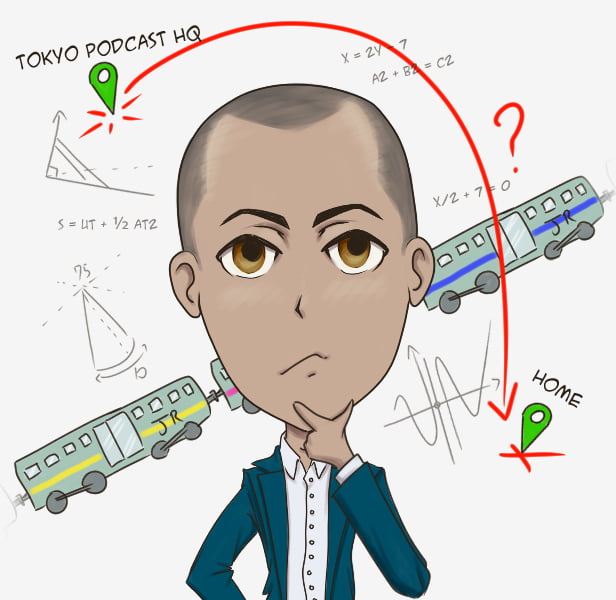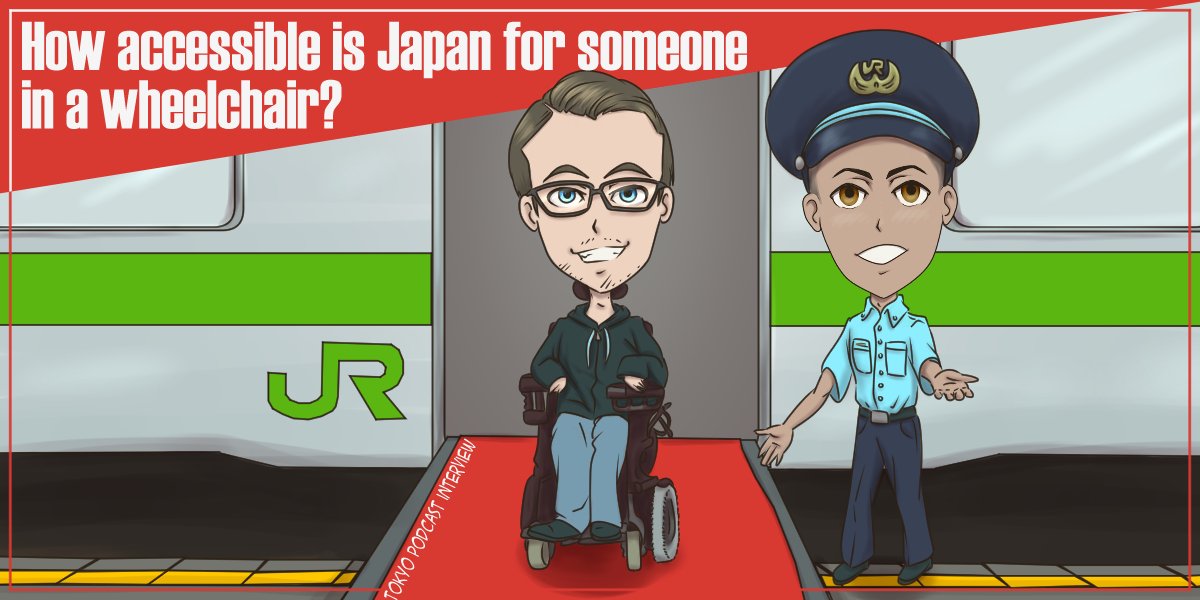In checking the analytics of Season One, the show I did about renting an apartment in Tokyo was one of the most popular shows. This is understandable as the process of finding your new home in Japan is never easy and for most people it could be the first time they encounter the joys of the Japanese Way!
The last time we spoke about renting an apartment in Japan was in Episode 49 of Season 1 – almost five years ago. With a few more Japan-based years under his belt, Anthony shares the best of his knowledge to make your apartment search as easy as possible.
Before You Start
- Be prepared to pay a HUGE amount of money in upfront move in fees! The average scenario is that you will need to pay the equivalent of four to six months rent for your initial fees. (see chart below).
- Some landlords won’t rent to you if you’re a foreigner. It’s Japan, deal with it and find another place.
- Your apartment will be completely unfurnished, be prepared to sleep on the floor until you can buy furniture.
- Don’t underestimate how nice it is to live close to the train station. The different between 3 minutes from the station to 7 minutes gets huge over time.
Choosing a Location
The location is important for both your quality of life and your budget. Consider the following points to choose the best location for you:
- If you have to commute to a specific place such as work or school, look for its nearest stations and work backwards along the train lines to find an area where you could live.
- The closer to the station the more expensive the rent will be, but keep in mind that extra five-minute walk can become unbearable during the sweat-inducing summer.
- Before you sign all your paperwork, take the train during rush hour to see if you can tolerate that everyday!
- If you’re still unsure, just tell the rental agency where you live and what type of neighbourhood you’d like to live in.
Rental Agencies
Once you have as many of your ducks in a row as possible, look for real estate agents with properties in the areas you like. You will rent rental agencies located in every neighborhood in Tokyo but most of them will not speak any language but Japanese.
We recommend starting with realestate.co.jp – run by the same company that runs GaijinPot. They cater specifically to foreigners and have the largest database of foreigner-friendly apartments.
Keep in mind that Real Estate Japan is still just a listing service and that if you send an inquiry you will still be dealing with a Japanese rental agency but all the agents listed there can be some degree of English so you should have less issues that going through a local Japanese agency.
Another recommendation if you can speak intermediate Japanese, is UR-housing who often have government-backed deals with lower initial costs. UR Housing is a good option because they do not charge a lot of the typical fees that Japanese agencies do. The downside is that you have to have a good level of Japanese to be able to communicate with them.
You may notice that there are agents all over Tokyo with apartment vacancies plastered across their office windows. These agencies can be good starting points if you know exactly where you want to live and speak near-fluent Japanese.

Initial Fees
Always inquire about all up-front costs and hidden fees before signing a contract. At the most, initial costs could include all of the following, and at the least, they will include the first month’s rent and maintenance fee.
Generally speaking, the longer the contract, the more stringent the conditions are, and the greater the initial fee will be.
– Deposit: Sometimes refundable, if so it will be returned a couple of months after you vacate the apartment – unless there are damages. Usually 1-2 months rent.
– Key money: Non-refundable bribe to the landlord. Usually 1-2 months rent.
– Agency fee: Non-refundable. Usually 1-1.5 months rent.
– Guarantor fee: If you don’t have a guarantor you will need to pay a guarantor company. Usually 1 months rent
– Lock changing fee: Non-refundable fee for changing locks.
– Cleaning fee
– Insurance fee
– Initial rent
– Initial maintenance fee
Although the fees can be high – especially for longer stays – there are some benefits to Japan’s system. For example: inflation is low, so monthly rents rarely increase. And many of the laws are stacked in the tenant’s favour, making it difficult for you to be evicted – within reason obviously!
| Average Move In Cost For A ¥80,000 Apartment | ||
| First Month’s Rent | 1 months rent | ¥80,000 |
| Damage Deposit | 1 ~ 2 months rent | ¥80,000 ~ ¥160,000 |
| Key Money | 1 ~ 2 months rent | ¥80,000 ~ ¥160,000 |
| Agency Fee | 1 ~ 1.5 months rent | ¥80,000 ~ ¥120,000 |
| Guarantor Fee | not refundable | ¥80,000 |
| Cleaning fee | n/a | ¥30,000 |
| Lock Changing Fee | n/a | ¥15,000 |
| Insurance Policy | n/a | ¥20,000 |
| Total Initial Move In Costs: | Low: ¥465,000 High: ¥665.000 | |
If you aren’t keen on paying a small fortune in fees, I would recommend checking out Tokyo Rent. They are a foreigner friendly real estate agency that is very flexible with the tenants that they will accept.
Paperwork
Once you start the application process it can take up to a week for all the paperwork to be approved. To avoid any delays it is best to have all your documents ready and typically you will need the following:
- Proof of identity: Resident’s card or passport
- Valid long term visa
- Employer’s letter or certificate of eligibility (for students)
- Proof of income
- Japanese bank account (although some foreigner-friendly rentals allow international payments via credit card)
- Japanese phone number
- An emergency contact
Japanese Terminology
– Apaato (アパート): A wooden apartment building, often on the older side, with minimum sound and heating insulation.
– Manshon (マンション): Not the mansion you might be thinking of… This is an apartment (condo) in a steel structure or concrete building, usually more expensive than an Apaato.
– Share House (シェアハウス): A private bedroom in a house or complex with shared bathrooms and living areas (all furnished). Larger share houses often include use of other facilities (gym, bike, theatre). Recommended for making new friends and language exchanges.
– Furnished Apartment: A “ready-to-go” place, usually between a 1K and 2LDK.
– Serviced Apartment: Similar to furnished apartments but more expensive and with “hotel-style” services, suitable for shorter stays or long-term business travel.
– Jo (丈): The size of one tatami mat (approx. 180 cm x 90 cm) which is used for room dimensions in traditional Japanese apartments.
– LDK stands for living room, dining room and kitchen. Variations of these acronyms exist depending upon what’s included in the apartment and how many rooms there are. The numerical prefix indicates how many bedrooms there are. For example:
- 1K: One room apartment with a kitchen but no living or dining space.
- 1DK: One room apartment with no living space.
- 1LDK: One bedroom apartment with living, dining and kitchen spaces. The living, dining and kitchen areas could just be one room.
- 2LDK: Two bedroom apartment with living, dining and kitchen spaces.
Furnishing Your Home
Once you’ve filled out all the paperwork and handed over a small fortune in fees, you will be given the keys to your totally unfurnished apartment!
One of the easiest ways to furnish your apartment is to look for what is called ‘sayonara sales’ on websites such as Craiglist or Facebook. Since it is expensive to dispose of household appliances in Japan, many departing expats will give away their stuff for free.
– Second-hand furniture from locals: Craigslist, GaijinPot Classifieds, Facebook Groups, are good places to start.
– Recycle shops (リサイクルショップ): Used goods which provide used goods and can be found all around Japan. Look for one new your apartment.
– Hundred Yen (Hyaku En) Stores: These shops sell all sorts of home furnishings for 100 yen (108 yen including tax)
– New furniture: For more expensive or larger items popular chains are Nitori (delivers), Ikea (doesn’t deliver) and AEON (delivers).
Recommended Housing Links
- Real Estate Japan
- UR Housing
- Tokyo Rent
- Social Apartments
- Oak House
- Sakura House
- AirBnB (stays of up to three months)








